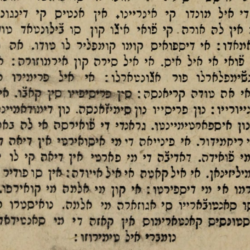| Source (Hebrew) | Translation (Ladino) | Transliteration (Romanized Ladino) | Translation (English) |
|---|---|---|---|
שמות א:יד |
Exodus 20:1-14 | ||
וַיְדַבֵּר אֱלֹהִים אֵת כׇּל־הַדְּבָרִים הָאֵלֶּה לֵאמֹר׃ |
אי הבלו איל דיו אטודאש לאש פלברש אישטאש פור דיזיר: |
Y hablo el Dio a todas las palabras estas, por dezir: |
God spoke all these words, saying: |
(1) אָנֹכִי יְהֹוָה אֱלֹהֶיךָ אֲשֶׁר הוֹצֵאתִיךָ מֵאֶרֶץ מִצְרַיִם מִבֵּית עֲבָדִ͏ים׃ לֹא־יִהְיֶ͏ה־לְךָ אֱלֹהִים אֲחֵרִים עַל־פָּנָ͏ַי׃ |
יו יי טו דיו קי טי שאקי די טיירה די מצרים די קאשה די שיירבוש. |
Yo Adonay tu Dio, que te saque de tierra de Miṣrāyim, de casa de siervos. |
I Adonai am your God who brought you out of the land of Egypt, the house of bondage: |
(2) לֹא־תַעֲשֶׂה־לְךָ פֶסֶל וְכׇל־תְּמוּנָה אֲשֶׁר בַּשָּׁמַיִם מִמַּעַל וַאֲשֶׁר בָּאָרֶץ מִתָּ͏ַחַת וַאֲשֶׁר בַּמַּיִם מִתַּחַת לָאָרֶץ׃ לֹא־תִשְׁתַּחֲוֶה לָהֶם וְלֹא תׇעׇבְדֵם כִּי אָנֹכִי יְהֹוָה אֱלֹהֶיךָ אֵל קַנָּא פֹּקֵד עֲוֺן אָבֹת עַל־בָּנִים עַל־שִׁלֵּשִׁים וְעַל־רִבֵּעִים לְשֹׂנְאָי׃ וְעֹשֶׂה חֶסֶד לַאֲלָפִים לְאֹהֲבַי וּלְשֹׁמְרֵי מִצְוֺתָי׃ |
נון שיאה אטי דיושיש אוטרוש דילאנטי מי. נון הגאש אטי אדולו ני נינגונה שימיגֿאנסה קי אינלוש סיילוש די אריבה אי קי אינלה טיירה די אבאשֿו אי קי אינלש אגואש דיבשֿו אלה טיירה. נון טי אינקובריש אאיליוש אי נון לוש שירבאש; קי יו יי טו דיו דיו סילושו שיקוטאן דיליטו די פדריש שוברי היגֿוש שוברי טירסירוש אי שוברי קוארטוש אמיש אבוריסייטיש; אי האזיין מירסיד אמיש אמיגוש אי אה גוארדטיש מיש אינקומינדנסאש. |
Non sea a ti dioses otros delante mi. Non hagas a ti idolo, ni ninguna semeǰança que en los çielos de arriba, y que en la tierra de abaxo, y que en las aguas debaxo a la tierra. Non te encoreves a ellos, y non los sirvas; que yo Adonay tu Dio, Dio çeloso, secután dilito de padres sobre hiǰos, sobre terçeros y sobre quartos, a mis aborreçientes. Y hazién merçed a miles, a mis amigos y a guardantes mis encomendanças. |
You shall have no other gods besides Me. You shall not make for yourself a sculptured image, or any likeness of what is in the heavens above, or on the earth below, or in the waters under the earth. You shall not bow down to them or serve them. For I your God Adonai am an impassioned God, visiting the guilt of the parents upon the children, upon the third and upon the fourth generations of those who reject Me, but showing kindness to the thousandth generation of those who love Me and keep My commandments. |
(3) לֹא תִשָּׂא אֶת־שֵׁם־יְהֹוָה אֱלֹהֶיךָ לַשָּׁוְא כִּי לֹא יְנַקֶּה יְהֹוָה אֵת אֲשֶׁר־יִשָּׂא אֶת־שְׁמוֹ לַשָּׁוְא׃ |
נון גֿוריש אה נומרי די יי טו דיו אלה וואנידאד; קי נון פירדונה יי אאיל קי גֿורה אשו נומרי אלה פֿאלשידאד. |
Non ǰures a nomre de Adonay tu Dio a la vanedad; que non perdona Adonay a el que ǰura a su nomre a la falsedad. |
You shall not swear falsely by the name of your God Adonai; for Adonai will not clear one who swears falsely by God’s name. |
(4) זָכוֹר אֶת־יוֹם הַשַּׁבָּת לְקַדְּשׁוֹ׃ שֵׁשֶׁת יָמִים תַּעֲבֹד וְעָשִׂיתָ כׇּל־מְלַאכְתֶּךָ׃ וְיוֹם הַשְּׁבִיעִי שַׁבָּת לַיהֹוָה אֱלֹהֶיךָ לֹא־תַעֲשֶׂה כׇל־מְלָאכָה אַתָּה וּבִנְךָ͏־וּבִתֶּךָ עַבְדְּךָ וַאֲמָתְךָ וּבְהֶמְתֶּךָ וְגֵרְךָ אֲשֶׁר בִּשְׁעָרֶיךָ׃ כִּי שֵׁשֶׁת־יָמִים עָשָׂה יְהֹוָה אֶת־הַשָּׁמַיִם וְאֶת־הָאָרֶץ אֶת־הַיָּם וְאֶת־כׇּל־אֲשֶׁר־בָּם וַיָּנַח בַּיּוֹם הַשְּׁבִיעִי עַל־כֵּן בֵּרַךְ יְהֹוָה אֶת־יוֹם הַשַּׁבָּת וַיְקַדְּשֵׁהוּ׃ |
מימרר אה דיאה דיל שבת פור שנטיפֿיקרלו. שיש דיאש פֿעטיגאראש אי האראש טודה טו אוברה, אי דיאה דיל שיטינו שבת פור יי טו דין; נון האגאש ניגונא אוברה טו ני טו היגֿו ני טו היגֿה טו שיירבו ני טו שיירבה ני טו קואטרופיאה ני טו פיליגרינו קי אינטוש וילייאש; קי שיש דיאש היזו יי אלוש סיילוש אי אלה טיירה אה לה מאר אי טודו לוקי איניליוש אי הולגו איניל דיאה איל שיטינו; פור טאנטו בינדישֿו יי אה דיאה דיל שבת אי שאנטיפֿיקולו. |
Memrar a dia del šabbāt por santificarlo. Ses dias fatigaras y haras toda tu obra, y Dia del seteno, šabbāt por Adonay tu Dio; non hagas ninguna obra, tu, hi tu hiǰo ni tu hiǰa, tu siervo, ni tu sierva, ni tu quatropea, ni tu pelegrino que en tus villas; que ses dias hizo Adonay a los çielos y la tierra, a la mar y todo lo que en ellos, y holgo en el dia el seteno; por tanto bendixo Adonay a dia del šabbāt y santeficolo. |
Remember the sabbath day and keep it holy. Six days you shall labor and do all your work, but the seventh day is a sabbath of your God Adonai: you shall not do any work — you, your son or daughter, your male or female slave, or your cattle, or the stranger who is within your settlements. For in six days Adonai made heaven and earth and sea — and all that is in them — and then rested on the seventh day; therefore Adonai blessed the sabbath day and hallowed it. |
(5) כַּבֵּד אֶת־אָבִיךָ וְאֶת־אִמֶּךָ לְמַעַן יַאֲרִכוּן יָמֶיךָ עַל הָאֲדָמָה אֲשֶׁר־יְהֹוָה אֱלֹהֶיךָ נֹתֵן לָךְ׃ |
אונרה אטו פאדרי אי אטו מאדרי פורקי שי אלארגין טוש דיאש שוברי לה טיירה קי יי טו דייו דאן אטי. |
Onra a tu padre y a tu madre, porque se alarguen tus dias sobre la tierra que Adonay tu Dio dán a ti. |
Honor your father and your mother, that you may long endure on the land that your God Adonai is assigning to you. |
(6) לֹא תִּרְצָ͏ח׃ |
נון מאטיש. |
Non mates. |
You shall not murder. |
(7) לֹא תִּנְאָ͏ף׃ |
נון הורניקיש. |
Non horniques. |
You shall not commit adultery. |
(8) לֹא תִּגְנֹב׃ |
נון הורטיש. |
Non hurtes. |
You shall not steal. |
(9) לֹא־תַעֲנֶה בְרֵעֲךָ עֵד שָׁקֶר׃ |
נון אטישטימונייש אין טו קונפאניירו טישאיגו די פֿאלשידאד. |
Non atestemuñes en tu conpañero testigo de falsedad. |
You shall not bear false witness against your neighbor. |
(10) לֹא־תַחְמֹד אֵשֶׁת רֵעֶךָ וְעַבְדּוֹ וַאֲמָתוֹ וְשׁוֹרוֹ וַחֲמֹרוֹ וְכֹל אֲשֶׁר לְרֵעֶךָ׃ |
נון קובידיסייש קאשה די טו קונפאניירו; נון קובדיסייש מוגֿיר די טו קונפאניירו אי שו שיירבו ני שו שיירבה ני שו בואי ני שו אשנו ני טודו לו קי אטו קונפאניירו. |
Non cobdiçies casa de to conpañero; non cobdiçies muğer de tu conpañero, y su siervo, ni su sierva, ni tu buey, ni du asno, no todo lo que a tu conpañero. |
You shall not covet your neighbor’s house: you shall not covet your neighbor’s wife, or male or female slave, or ox or ass, or anything that is your neighbor’s. |
There are various traditions as to the numbering of the commandments, as well as the enumeration of verses of the Decalogue, the Ten Commandment. In this transcription of the Ladino text we are following the numeration of verses according to the Constantinople Codex of 1547 C.E., as edited by the great scholar Professor Moshe Lazar (z”l) of the University of Southern California in 1988. This newly typeset text is an original transcription by Reb Shmuel Gonzales, of the Boyle Heights Chavurah – of the grassroots Jewish community of East Los Angeles, California; transcriber and editor of Sephardic texts for the Open Siddur Project; in celebration of Shavuot of 5783, and published in May of 2023.

“The Ten Commandments (Exodus 20:1-14) in Ladino translation from the Constantinople Codex (1547)” is shared through the Open Siddur Project with a Creative Commons Attribution-ShareAlike 4.0 International copyleft license.







Leave a Reply